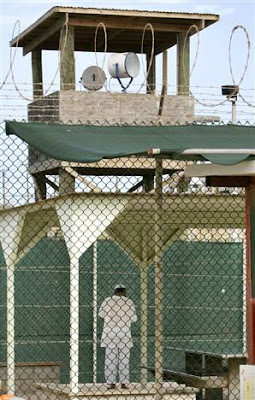Saturday, June 30, 2007
Supreme Court To Rule On Legality Of Guantanamo Detention Policy

The Supreme Court yesterday reversed itself and agreed to consider whether detainees at Guantanamo Bay have been unfairly barred from the federal courts by the Bush administration and Congress, a move that may finally determine legal rights for foreign-born terrorism suspects.
The case, which could become one of the most important of the court's next term, will address whether subjecting the detainees to military commissions instead of allowing them access to federal courts violates the Constitution. In April, the court decided not to hear an appeal from the detainees.
Yesterday's decision to change course and hear the case was so unusual that lawyers and court experts went to the archives to try to find the last time it happened. The only consensus was that it had been decades.
"The Supreme Court is going to decide the simple question: Does the Constitution protect the detainees?" said Georgetown University law professor Neal K. Katyal, who successfully argued a detainee case that the court decided just a year ago. In that case, the justices said President Bush did not have authority to set up the military tribunals that the administration thought should hear the cases against the detainees.
In April, three justices -- David H. Souter, Ruth Bader Ginsburg and Stephen G. Breyer -- said they were eager to hear the appeals, which presented questions that "deserve this court's immediate attention." It takes four justices to agree to take a case.
Justices John Paul Stevens and Anthony M. Kennedy said at the time that they would continue to monitor the legal proceedings involving the detainees. It takes five votes to rehear a denial, so perhaps the two justices concluded that they have seen enough. The court's order is silent on which justices agreed to hear the case.
The Bush administration had urged the court not to take the appeals. "The grant of a petition for rehearing from a denial of certiorari is an extraordinary remedy, warranted only where there have been 'intervening circumstances of a substantial or controlling effect' or 'other substantial grounds not previously presented,' " Solicitor General Paul D. Clement told the court this month, adding that petitioners had shown neither.
David Remes, a lawyer for some of the detainees who brought the case, said the court did not have to make the decision to take the case now, "so what obviously happened is the justices decided to confront the issue sooner rather than later." ...
The Supreme Court had twice ruled that Guantanamo detainees had access to federal courts to contest their incarcerations, but the court also made clear that Congress could weigh in on the issue. Lawmakers did so last fall by approving the Military Commissions Act, which stripped habeas corpus rights and mandated special military trials for the detainees.
In February, the U.S. Court of Appeals for the District of Columbia Circuit upheld the habeas corpus provision of the act, and that case is what the court agreed to hear yesterday.


